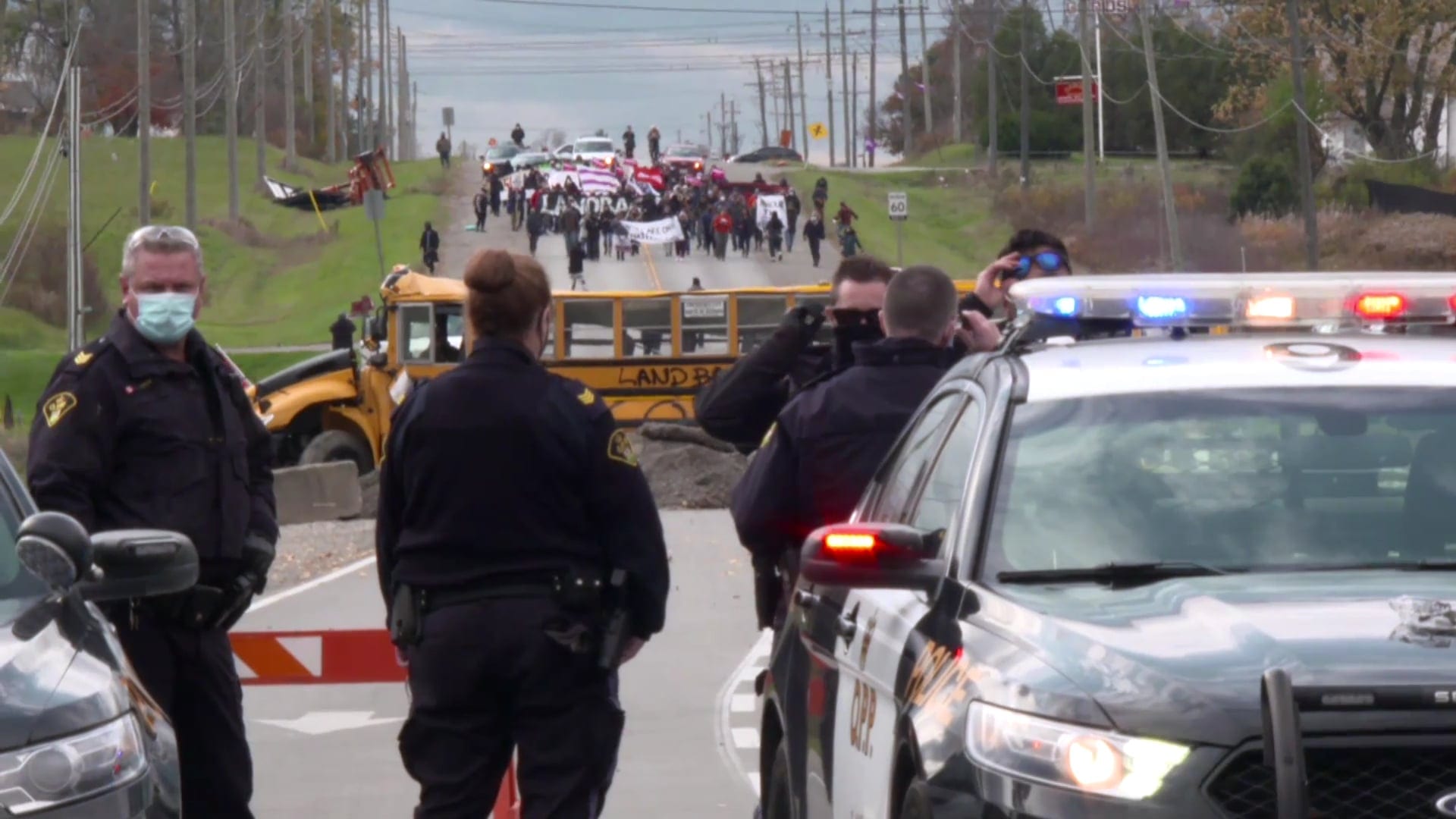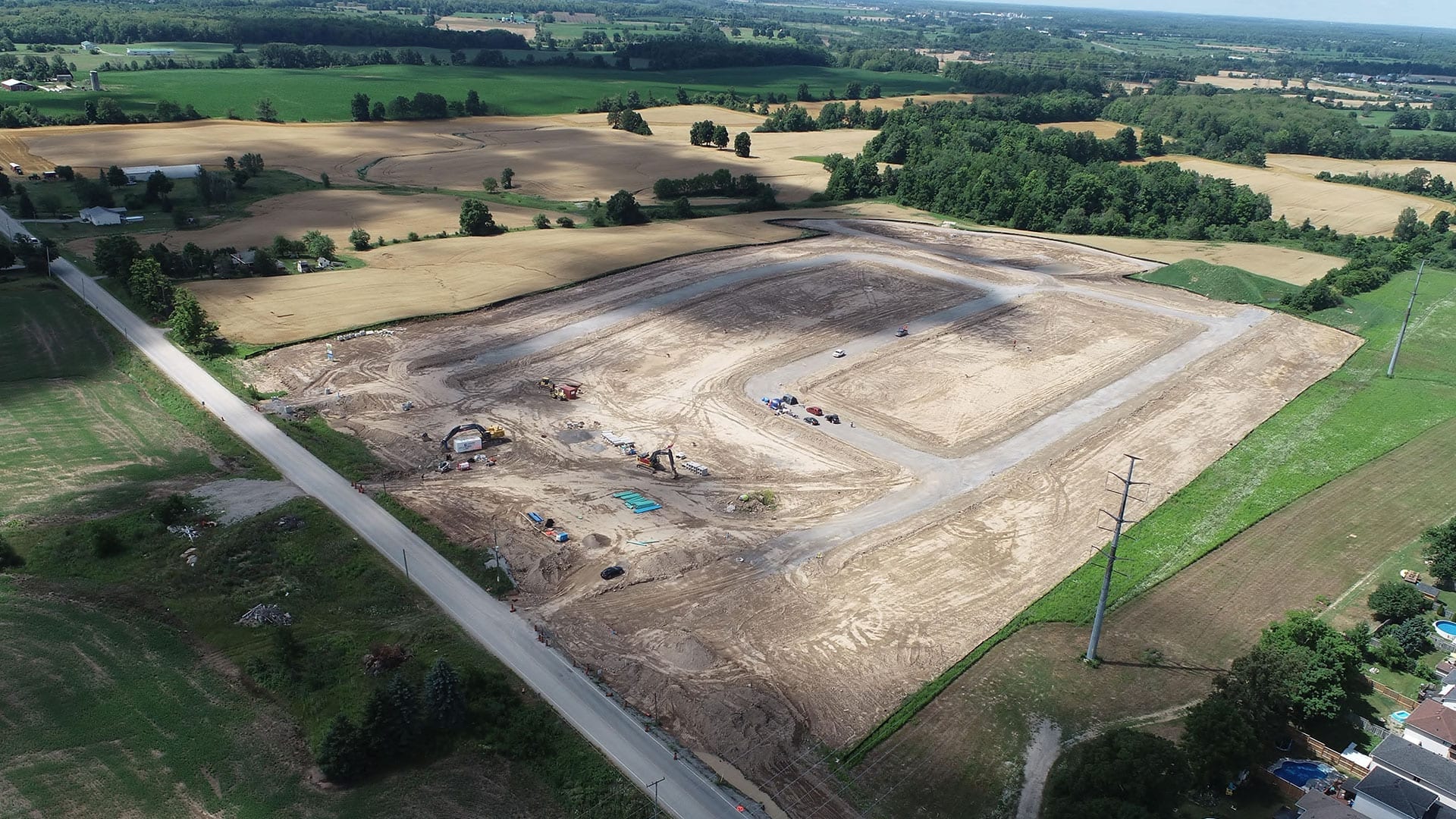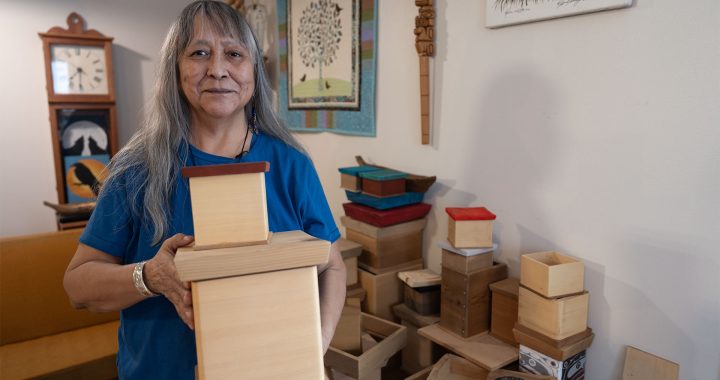
An OPP cruiser drives by the blocked entrance to the McKenzie Meadows construction site in August 2020. Photo: APTN
The Ontario Provincial Police (OPP) spent $16.3 million in just half a year policing the Haudenosaunee-led occupation of the McKenzie Meadows housing development in Caledonia, Ont., according to provincial government records obtained by APTN News through freedom of information.
The figures reveal the OPP were spending between $2 million and $3 million per month on salaries, round-the-clock overtime, food, hotels, travel costs, supplies, equipment, building rentals and other related expenses between July 2020 and January 2021.
“I’m absolutely flabbergasted by this number,” said Skyler Williams, spokesperson for the occupation, in a phone interview. “That’s painful to think that we’re spending that on 20 people sitting in a field singing songs around the fire.”
Six Nations members and supporters moved onto the construction site — about 20 km south of Hamilton — on July 19, 2020 and dubbed it 1492 Land Back Lane. A few weeks later, a police crowd-control unit raided the encampment and made arrests using stun guns and rubber bullets.
Supporters of the group promptly retaliated by lighting tires on fire and erecting blockades on roads and train tracks. About 50 people soon overwhelmed police at the camp’s back entrance and retook the site later that evening, according to an OPP court filing.
The group reached a consensus to dismantle the barricades at the end of August. A court battle over injunctions ensued while police continued making arrests.

In October, a judge made two injunctions permanent, ordering the camp vacated and prohibiting roadblocks. The conflict flared again only hours later after police tried to arrest somebody at a nearby support camp.
Police again fired a stun gun and shot a rubber bullet with a special riot control gun in the rumble that followed.
The group again responded with fires and blockades.
They dug a series of trenches across the road and laid a crushed-up school bus along Caledonia’s main thoroughfare, creating a strategic protected zone around the camp.
This situation persisted until February, when the barricades were dismantled again.
Roads were repaired and reopened to traffic, but the camp still stands.

Expenditures peaked at $3.8 million for the month of November immediately following the second round of blockades. Ultimately, according to records, the OPP spent $16,272,709 by Jan. 19, 2021 — exactly six months after the occupation started.
“What an amazing waste of money,” remarked Williams.
“Rather than spending $16.3 million on policing and seeing the criminalization of Indigenous people standing up for their rights, they could’ve sent two ministers down here from the feds, a couple from the province, and resolved this in a peaceful way eight months ago.”
The OPP set up a command post at the public library where one- to two-dozen police cruisers often sat parked along with, at one point, an armoured police vehicle. Similarly, police cruisers filled the parking lot of a Hamilton hotel at night, while the detachment in nearby Cayuga also saw a personnel boost.
The cops regularly stationed about a half dozen cruisers at each of their own checkpoints 24 hours a day. This was in addition to specialized officers often on patrol, such as plainclothes liaisons, intelligence specialists and drone operators.

“It is amazingly disheartening to hear that we are spending that kind of dollars to send in this militarized policing and surveillance,” said Williams. “It’s absolutely ridiculous. It’s more than what the developer even paid in the first place.”
By comparison, according to CBC, the RCMP spent more than $13 million policing the Coastal GasLink standoff on Wet’suwet’en territory in northern British Columbia between January 2019 and March 2020.
This timeframe included two paramilitary-style tactical raids. It means the OPP have been spending more than twice the rate of the B.C. RCMP in that ongoing conflict.
APTN asked the OPP to comment on the expenditure. They supplied the following statement.
“The OPP is committed to public safety and security and has maintained that objective throughout. Having sufficient resources on hand to ensure the safety of the public, the police and the demonstrators was paramount,” wrote Const. Rod LeClair.
“It would be inappropriate for me to comment on operational details which include staffing and/or resources deployed to assist.”

The 25-acre McKenzie Meadows development was slated to become a 218-home suburb directly adjacent to Caledonia’s urban area.
“It is likely that these homes will never be built,” predicted lawyers representing Caledonia residents and businesses in a proposed class-action lawsuit filed against the OPP and the province in November.
They are seeking unspecified damages and allege the defendants were negligent when it comes to the blockades. Ontario refused to comment when previously contacted by APTN.
Foxgate Developments acquired the property from a company owned by a local property developer for $4 million in 2015. In May 2020, they took out a $20-million loan from Toronto-Dominion Bank, likely an institutional mortgage to finance the development, according to the parcel register and accompanying court filings.
But the area has been contested for a long time. In 2006, a nearby parcel was slated to become the Douglas Creek Estates subdivision before it was reclaimed by Six Nations members and renamed Kanonhstaton.
The two disputed properties are connected by a pipeline and hydro access corridor. They sit directly between the southernmost urbanized area of Caledonia and the northeastern border of Six Nations territory.
In 2006, the province purchased the Douglas Creek project from that developer for $15 million. Queen’s Park later paid $20 million to settle a class action similar to the one currently before the courts. Policing operations also incurred more than $30 million in costs.
The situation was never resolved politically or legally, however, and the current civil unrest is an extension of a centuries-old dispute over land tenure along the winding banks of the Grand River.
The Six Nations elected council submitted 29 land claims to the government beginning in 1982, with only one resolved. Ottawa closed these claims after the council filed a civil action in court. A trial in this case has not begun.
The land back group has appealed the injunctions. These appeals have not yet been heard in court.










